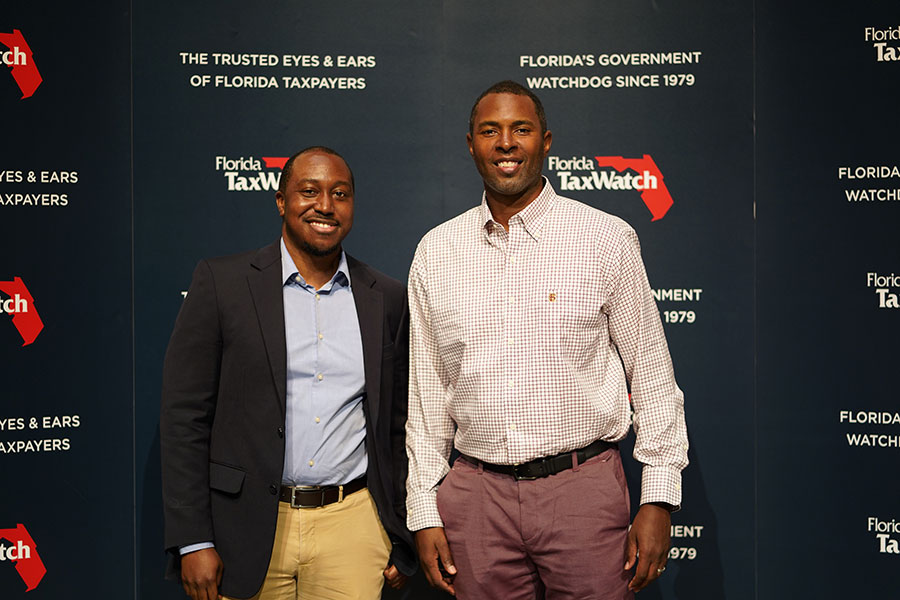
Florida State University strengthened its reputation as one of the most efficient universities in the nation by claiming five awards at the 2018 Prudential Productivity Awards ceremony, held June 5 at Ruby Diamond Concert Hall.
Established in 1989, the Prudential Productivity Awards program recognizes and rewards state employees who find ways to improve services, increase efficiency and save taxpayers money. The awards are made possible by Prudential Financial and co-sponsored by Florida TaxWatch, the Florida Council of 100 and the State of Florida.
Florida State’s “Take 15” initiative — a university-wide campaign designed to encourage students to take a full course load of 15 credit hours or more each semester — was one of 24 projects to win the program’s top award from across the state.
The effort, spearheaded by Provost and Executive Vice President for Academic Affairs Sally McRorie and Associate Vice President for Academic Affairs Rick Burnette, involved thorough research, marketing and an advising campaign that significantly helped students improve their academic performance, graduate earlier and save money on the cost of their degree. Project administrators estimate the overall savings to FSU students and Florida taxpayers total nearly $86 million since Take 15 launched in 2015.
“We are honored to be recognized with this award, but we believe the students are the big winners,” Burnette said. “By earning their bachelor’s degree on time in four years or less, they can begin their careers sooner, forego expenses required for an extra year or two in college, decrease their loan debt and also increase their lifetime earnings.”
After examining the historical data at FSU, it was clear to administrators that students who took at least 15 hours each semester, regardless of major, socioeconomic status or high school performance, tended to receive higher grades and graduate sooner.
“I think the success of this program is emblematic of the data-informed approach that has been the hallmark of our nationally recognized student success efforts,” Burnette said.
The Take 15 initiative targeted freshmen who entered the university in Fall 2016. The result was a 131 percent increase in freshmen who took 15 hours or more, producing at the time, the highest average freshman course load in recent history at Florida State.
FSU has earned more annual Prudential Productivity Awards than any other Florida university since 2016, including Take 15 and four other projects that earned plaque awards this year.
Efficiency is a point of pride for Florida State, which has placed in the top two of the nation’s most efficient universities for six consecutive years, as ranked by U.S. News and World Report.
“FSU’s outstanding reputation for efficiency reflects how deeply we take to heart our stewardship as a public institution of the State of Florida,” said Kyle Clark, FSU vice president for Finance and Administration. “We are constantly assessing and enhancing our methods to improve business processes across campus.”
FSU’s Prudential Productivity plaque award winners are:
Controller’s Office
Achievement: FSU Auxiliary Accounting Team
Award Winners: Cassandra Rayne, Rashad James
An auxiliary accounting team in the FSU Controller’s office developed new processes to deal with accounts receivable and billing functions for auxiliary activity within Florida State University’s enterprise-level accounting system. Before implementing this project, departments that charged customers for goods or services used external systems to record this activity, resulting in inefficiencies and a lack of transparency. The new process allows auxiliary departments to record these transactions directly into Florida State’s official system of record, reducing the need for external systems and centralizing invoicing, payment processing and collections efforts for enhanced effectiveness. The changes resulted in about $400,000 in cost savings.
Facilities
Achievement: Maintenance, Repair and Operations (MRO) Cost Reduction Team
Award Winners: Christina Balterman, Anderson Poole, Clint Swearingen, James F. Stephens, Chad Cooper
The MRO team installed improved sheave and belt systems on the university’s HVAC units that greatly reduced the wear and tear on the belts and motors, ultimately reducing the number of times belts needed to be changed. The team also moved to a higher filter Minimum Efficiency Reporting Value (MERV) rating to reduce the number of filter changes. The improvements totaled nearly $75,000 in cost reduction savings.
College of Social Work
Achievement: Improved field application system
Award Winner: May Bolden
Academic Program Specialist May Bolden researched, designed, built and implemented a field application system for social work students pursuing field placements using the Fluid Review software licensed by the university. The new system improved service delivery for students, faculty and administrators. Unlike the old system, the new system interfaces with university student data so that many fields are pre-populated for students prior to starting the application, cutting down on the amount of information that students have to enter and minimizing application errors. The new system also allows for more robust communication among field faculty, students and placement agencies to ensure that students stay on task during the application process. The system is saving the college about $4,750 annually.
Facilities
Achievement: Lean Work Order Communications Team
Award Winners: Brian Fairhurst, Donna Trumbower, Chad Cooper, Ryan Porter, Jason Hosey, Ashley West, Kyle Knowles, Dianne Burnette
Faced with more than 36,000 annual work orders, a Facilities Lean Team was formed to better understand their respective roles, streamline a complex process, improve customer service and reduce the average number of days to complete work orders by more than 70 percent. The task was a pilot project for introducing Lean in the Facilities Department. As a result, the goals were achieved and electronic communications through the work order website and emails significantly improved. Employees estimate the changes saved the university about $103,000.




